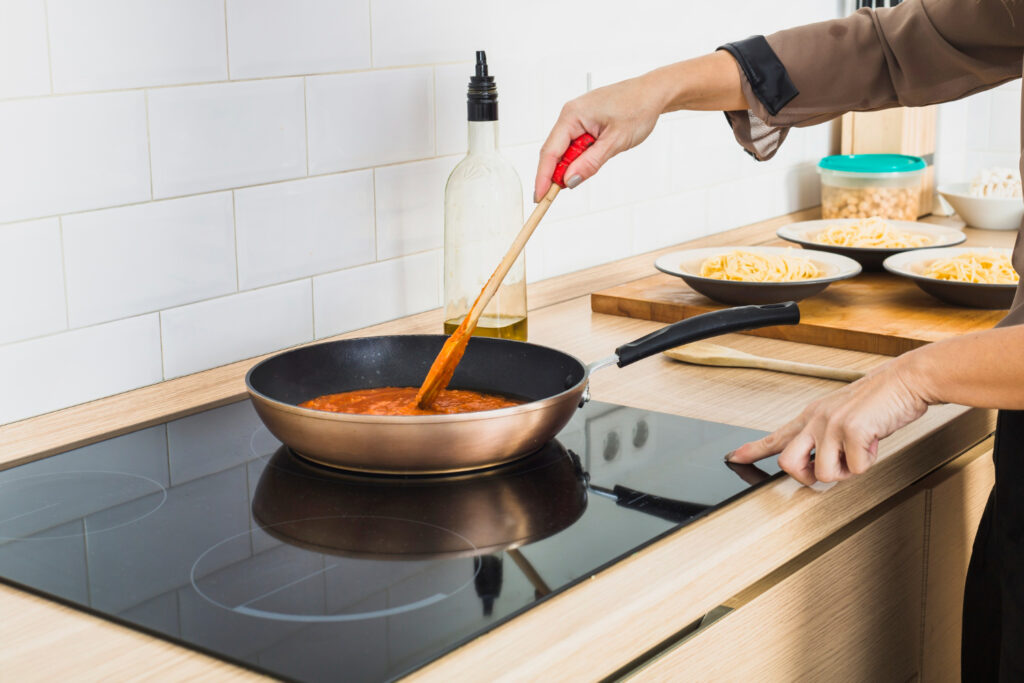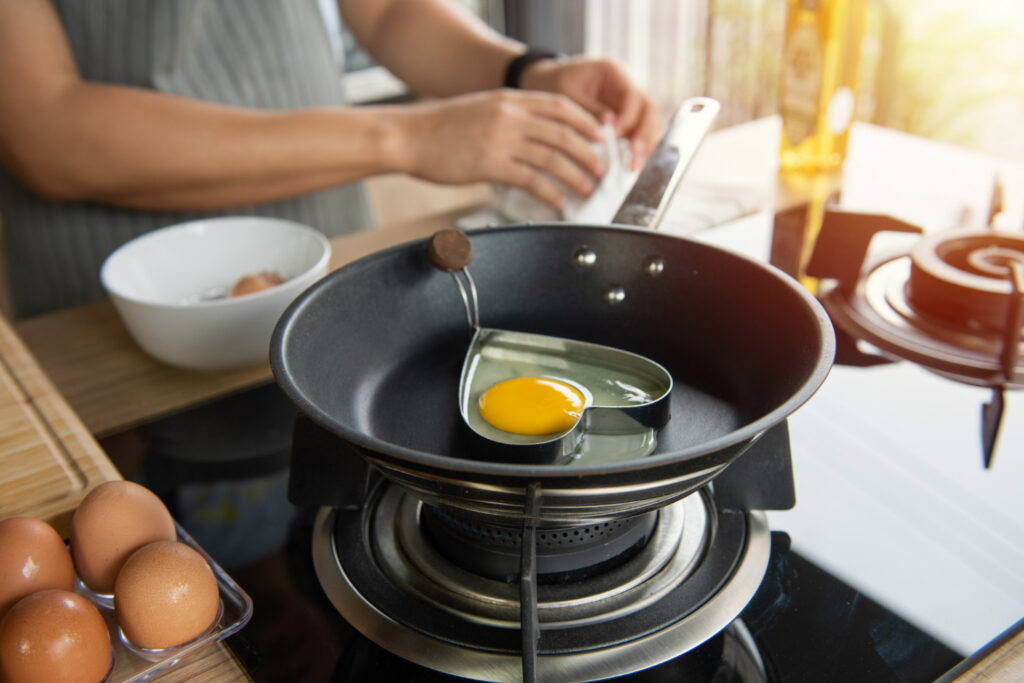When it comes to upgrading your kitchen, choosing between an induction cooktop and a gas cooktop can be challenging. In this scenario, Induction cooktop vs gas cooktop has been a hot debate for some time, and we are here to help you decide.
Gas and induction cooktops represent two distinct approaches to cooking, each with its advantages. It’s essential to understand the differences between these culinary powerhouses, whether you’re a seasoned chef or a novice in the kitchen. Let’s dive into the differences between Induction cooktops vs gas cooktops.
Induction Cooktop vs Gas Cooktop: The Differences
There are a number of differences between an induction cooktop and a gas cooktop. Such as:
1. Energy Efficiency
In the realm of modern kitchen appliances, energy efficiency has become a critical factor in decision-making. Not only does it have a significant impact on your utility bills, but it also contributes to a greener, more sustainable lifestyle.
Induction Cooktop

Induction cooktops have revolutionized the way we cook by employing cutting-edge electromagnetic technology. These cooktops heat your cookware directly, bypassing the conventional process of heating the surface first. The result?
Exceptional energy efficiency. Since the heat is generated within the cookware itself, there’s minimal heat loss, ensuring that nearly all the energy is used for cooking. This translates to faster cooking times and lower energy bills, a compelling combination for the environmentally conscious and busy home chefs.
Gas Cooktop

Gas cooktops, while efficient in their own right, take a different approach. They generate a flame that radiates heat in all directions, including the surrounding air. As a result, some energy is lost to the environment.
Though gas cooktops have improved over the years with features like sealed burners, they still can’t quite match the energy efficiency of their induction counterparts. However, the difference in energy consumption might be insignificant for casual home cooks.
2. Cooking Speed
One of the joys of cooking is being able to control the timing of your meals. When comparing induction cooktops and gas cooktops, both are known for their ability to provide rapid heating, but there are some nuances to consider.
Induction Cooktop
Induction cooktops are known for their remarkable speed when it comes to heating. How do they achieve this? It’s all about the direct transfer of energy through electromagnetic fields to your cookware.
The moment you turn on the induction cooktop, it starts sending the heat straight to the pot or pan. This near-instantaneous response is a boon for busy cooks, allowing you to start cooking as soon as you need to and quickly adapt to changing temperature requirements.
Gas Cooktop
Gas cooktops are no slouches when it comes to speed, either. They also provide instant heat when you turn the knob or ignite the burner. However, there might be a slight delay in achieving very high temperatures compared to induction cooktops.
The open flame can take a little time to reach its maximum heat output. That said, for most home cooking, this delay is negligible and shouldn’t deter you from considering a gas cooktop.
3. Temperature Control
When it comes to cooking, precision in temperature control can make a world of difference. Whether you’re simmering a delicate sauce, searing a steak, or boiling water, having the right temperature at your fingertips is essential. Let’s explore how induction cooktops and gas cooktops compare in this aspect:
Induction Cooktop
Induction cooktops are renowned for their precise temperature control. Thanks to their electromagnetic technology, you can make subtle adjustments to achieve the exact heat level you need.
This precision is a dream come true for culinary enthusiasts who often work with delicate ingredients or require precise temperature management for recipes. You can effortlessly switch from a gentle simmer to a rolling boil with a simple adjustment, ensuring that your dishes turn out just the way you intend.
Gas Cooktop
Gas cooktops also offer decent temperature control capabilities, allowing you to make quick changes to the flame’s intensity. However, they may not be as precise as induction cooktops.
Achieving specific low-temperature settings can sometimes be challenging, especially with older gas cooktop models. Nonetheless, for many home cooking applications, gas cooktops provide ample control and flexibility to meet your culinary needs.
4. Cooking Experience and Flexibility
The cooking experience and flexibility provided by a cooktop are paramount to your culinary journey. Your choice between induction and gas cooktops can significantly impact the way you cook and the dishes you create. Let’s delve into the cooking experience and versatility each option offers:
Induction Cooktop
Induction cooktops are prized for the delightful cooking experience they offer. Their instant and precise temperature control empowers you to experiment with a wide range of culinary techniques. Whether you’re sautéing, searing, simmering, or melting, induction cooktops can accommodate your every cooking whim. Additionally, the flat and smooth surface is easy to clean, reducing the time and effort needed to maintain a tidy kitchen.
The even distribution of heat on an induction cooktop means you’re less likely to encounter hot spots, making it an excellent choice for cooks who appreciate consistent results. The absence of an open flame also means that there’s no risk of accidental flare-ups, making it a safer option for households with children.
Gas Cooktop
Gas cooktops have their own set of advantages when it comes to cooking experience. The visible flame provides a tangible connection to your cooking process, and many professional chefs prefer the precise control offered by gas flames for techniques like flambeé.
Furthermore, gas cooktops often feature sturdy cast iron grates, allowing you to place pots and pans anywhere on the surface. This flexibility in cookware placement is especially appreciated by those who cook with large or irregularly shaped cookware.
While the open flame adds a certain charm to the cooking experience, it’s important to note that it can also present safety challenges, especially in households with inquisitive young children.
5. Safety
Safety is a paramount concern when it comes to kitchen appliances, and both induction and gas cooktops have their safety features and potential risks. Understanding these aspects is crucial for choosing the right cooktop for your home.
Induction Cooktop
Induction cooktops are designed with several safety features in mind. One of the most notable safety advantages is that the cooktop itself doesn’t get hot during cooking. The heat is generated within the cookware, so the surface remains relatively cool to the touch, significantly reducing the risk of burns. Many induction models also come with automatic shut-off functions, which can turn off the cooktop if it detects no cookware or if a pot or pan is removed for an extended period.
However, it’s essential to mention the potential concern about electromagnetic fields emitted during operation. While there is no conclusive evidence suggesting health risks, individuals with pacemakers or certain medical conditions may need to exercise caution.
Gas Cooktop
Gas cooktops also have safety measures in place. Modern models often feature flame failure sensors, which automatically cut off the gas supply if the flame goes out. This prevents gas leaks, making gas cooktops safer than older models. However, open flames do carry a risk of accidental burns, and the presence of a gas supply in the kitchen introduces potential gas leak hazards if not properly maintained.
To enhance safety, make sure to have proper ventilation in your kitchen when using a gas cooktop to prevent the accumulation of gas fumes.
Read More: How to Clean Induction Cooktop
The Takeaway
In the induction cooktop vs. gas cooktop showdown, both options have their strengths and considerations. The choice ultimately depends on your cooking style, preferences, and priorities. For those who value precision, energy efficiency, and safety, induction cooktops are an excellent choice. They offer rapid heating, precise temperature control, and an excellent, easy-to-clean surface.
On the other hand, gas cooktops provide a unique cooking experience, flexibility, and the charm of an open flame. They’ve also evolved with improved safety features. Your decision should align with your cooking aspirations, lifestyle, and budget. Whichever you choose, both induction and gas cooktops can enhance your culinary journey.





